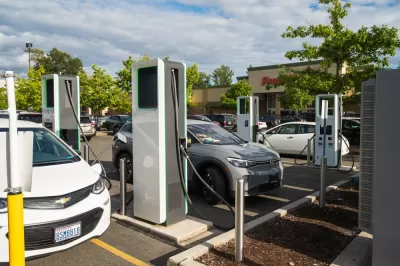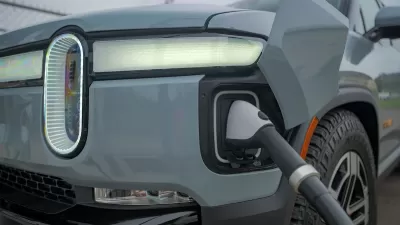The grant program is part of the 2021 infrastructure act, which promised to invest in charging and fueling stations for electric cars and other vehicles powered by alternative energy.

The federal Charging and Fueling Infrastructure (CFI) grant program, part of the 2021 infrastructure law, is now accepting applications for a $700 million program aimed at helping communities fill gaps in the charging and fueling infrastructure network for vehicles powered by alternative fuels like electricity or hydrogen.
As Daniel C. Vock explains in Route Fifty, “Unlike earlier rounds of funding to help states build a national charging network, the competitive grants announced this week are designed to fill in gaps where chargers are less likely to be installed by private entities.”
The 2021 law allocated $7.5 billion over five years to alternative fuel charging stations, with $5 billion slated to go toward a nationwide EV charging network. Of the remaining $2.5 billion, half is allocated to charging infrastructure at public facilities and the other half to improvements on major roads and highways. “Biden administration officials expect that most of the money going to local governments will be used to build Level 2 chargers, rather than the ‘fast chargers’ mandated along highways paid for with state grants. The slower chargers are easier to build and more practical for local residents than fast chargers, which are usually geared for motorists on long trips.”
FULL STORY: $700M in Grants for Local EV Chargers Announced

Alabama: Trump Terminates Settlements for Black Communities Harmed By Raw Sewage
Trump deemed the landmark civil rights agreement “illegal DEI and environmental justice policy.”

Planetizen Federal Action Tracker
A weekly monitor of how Trump’s orders and actions are impacting planners and planning in America.

Why Should We Subsidize Public Transportation?
Many public transit agencies face financial stress due to rising costs, declining fare revenue, and declining subsidies. Transit advocates must provide a strong business case for increasing public transit funding.

Understanding Road Diets
An explainer from Momentum highlights the advantages of reducing vehicle lanes in favor of more bike, transit, and pedestrian infrastructure.

New California Law Regulates Warehouse Pollution
A new law tightens building and emissions regulations for large distribution warehouses to mitigate air pollution and traffic in surrounding communities.

Phoenix Announces Opening Date for Light Rail Extension
The South Central extension will connect South Phoenix to downtown and other major hubs starting on June 7.
Urban Design for Planners 1: Software Tools
This six-course series explores essential urban design concepts using open source software and equips planners with the tools they need to participate fully in the urban design process.
Planning for Universal Design
Learn the tools for implementing Universal Design in planning regulations.
Caltrans
Smith Gee Studio
Institute for Housing and Urban Development Studies (IHS)
City of Grandview
Harvard GSD Executive Education
Toledo-Lucas County Plan Commissions
Salt Lake City
NYU Wagner Graduate School of Public Service





























